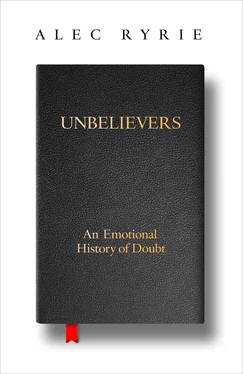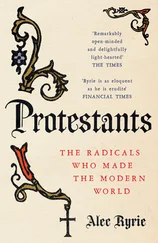The plainest sign of this is that, together with unbelievers and garden-variety heretics, inquisitors regularly dredged up self-taught individuals who spanned the range from idiosyncratic through eccentric to insane. The Italian who argued in 1275 that our bodies cannot be made by God, since death would not otherwise extinguish our senses, claimed to have deduced this and other weird doctrines ‘from his own cogitations’.[20] English bishops hunting Lollards came across individuals whose claims – that Heaven is below the earth, that the Virgin Mary belonged to the Holy Trinity while Christ did not, that Christ had had eighteen apostles – do not reflect any known theological system. A later generation of churchmen enjoyed shocking one another with tales of the man who ‘thought Christ was the Sun, that shineth in the firmament; and the Holy Ghost was the Moon’, or the one who believed his soul was ‘a great bone in his body, and … after he was dead, … if he had done well, he should be put into a pleasant green meadow’.[21] These people are witnesses to an eternal truth: you don’t need to know what you’re talking about in order to have an opinion.
By now we have strayed into a different mood. Mortalism and wilder speculations were not usually fired by anger, but by anxiety, that meeting point of curiosity and fear. What happens to us after we die is a subject worth being anxious about. In the late 1160s, King Amalric of Jerusalem – a corpulent, studious prince who was no friend of the Church’s privileges – fell ill. He summoned William, the archbishop of Tyre, to ask a question that William thought ‘hardly admitted of discussion’: ‘whether … there was any way of proving by reliable and authoritative evidence that there was a future resurrection?’ The shocked archbishop insisted that Christ’s teaching was all the evidence needed, but Amalric asked ‘whether this can be proved to one who doubts these things and does not accept the doctrine of Christ and believe in a future resurrection’. William claimed to have settled the royal conscience with only a few words. Perhaps: but the episode suggests that doubt could surface literally anywhere in medieval Christendom, especially when a brush with illness or danger made fine words about immortality sound flimsy.[22]
King Amalric’s scepticism may have pained his archbishop, but it did not deeply alarm him. Anxieties of this kind – shallow-rooted, always springing up afresh – were a perennial feature of medieval Christendom, but not a serious threat to it. Perhaps they were mere weeds, a tolerable and inescapable problem that could never be permanently eradicated but could be managed. Perhaps they were even a necessary part of the ecosystem, helping the true faith to stay limber. There was no reason to suspect that these medieval doubters were the start of anything. A few weeds were not about to uproot the tree of faith. But when fresh doubts did begin to sprout, they did not do so in virgin soil in which no seed of unbelief had ever been sown.
Physicians, ‘Naturians’ and ‘Nulla Fidians’
If the bishop at King Amalric’s sickbed tried to preserve him in the faith, the same may not have been true of his physicians. To summon medical help was to enter a notoriously sceptical world, a nest of paganism at the heart of Christendom.
Medieval and early modern medicine owed virtually nothing to Christianity. It drew partly on Islamic and, especially, Jewish sources: whether ailing Christians might put themselves in the hands of Jewish doctors was a long-standing dilemma, in which niceties of conscience were usually overwhelmed by practical urgency. Beneath it all, however, Europe’s medical tradition looked to Galen, the great Greek physician of the second century, ‘the most heathenish of all writers’, who did not believe in an immortal soul and whose towering authority Christianity struggled either to undermine or to co-opt.[23]
Even apart from this dangerous inheritance, physicians’ vocation was in inevitable tension with Christianity. They were in the business of changing fate, not submitting to it. They were interested in natural causes of illness, which could be treated, not supernatural ones, against which they were powerless. And they had a vested interest in persuading patients that their methods were more effective than any priest’s rituals. In the twelfth century, it was already said that physicians tended to place ‘undue emphasis upon nature, in … opposition to faith’. In the thirteenth century ‘damned and false men’ were arguing that the Bible ‘speaks falsely’ by describing epilepsy as demonic possession.[24] The fourteenth-century Italian physician Peter of Abano claimed that supposed resurrections were merely natural resuscitations of people who were not in fact dead, and indeed that ‘there is an infirmity which can keep a man insensible for three days and nights, so that he appears dead’. Perhaps Christ had merely passed out and then recovered? Peter died before these remarks could catch up with him, but he was posthumously burned for heresy just in case he was right.[25] In 1497 another physician was tried in Bologna on charges of dismissing Christ’s miracles as natural phenomena. ‘It’s simply not possible’, a Venetian physician supposedly said in 1575 of the miracles worked by his professional rivals in the Church: ‘it’s all an invention of the priests to get more money’.[26] Unbelief, admitted the seventeenth-century English doctor Sir Thomas Browne, was ‘the general scandal of my profession’.[27]
How widespread this sort of thing really was is impossible to say. What is clear is that, running right through the medieval and early modern periods and beyond, there was a well-established stereotype: the sceptical, amoral and self-serving physician, a colleague to the deceitful, amoral and self-serving lawyer and the hypocritical, amoral and self-serving priest. It is already there in Chaucer, whose physician’s studies were ‘but little on the Bible’. A seventeenth-century proverb had it that ‘where there are three physicians, there are two atheists’.[28] Stereotypes of this kind may be unfair or ill-founded, but they take on a life of their own. Sometimes people who grow weary of labouring under hostile assumptions decide they may as well be hanged for a sheep as a lamb.
Medics’ supposed atheism was of a specific kind. They were described as ‘naturians’, often ‘mere’ or ‘sole’ naturians. ‘The disease incident to your profession’, one preacher told physicians, is ‘even to be half Atheists, and that by ascribing so much to natural and second causes, and too little to God’. What made it worse was that their patients might be tempted into similar unbelief, placing their hopes for recovery in a doctor’s skill rather than God’s mercy.[29] The more expert the physician, the more likely that his expertise would blind him to the larger truth, and that he would, as the great physician-philosopher Robert Burton warned, ‘attribute all to natural causes’.[30]
In the 1560s, the English physician William Bullein penned a vivid fictional portrait of this kind of unbelief. Antonius, a wealthy merchant, consults Medicus, his physician, frankly admitting that he would spend his entire fortune to save his life, and recalling that in his ‘last great Fever’ he had paid Medicus handsomely. Already we are some way from the Christian ideal, in which the sick submit to God’s will and devote themselves to prayer and charity. But Medicus, knowing on which side his bread is buttered, praises Antonius’ attitude, and supports it by quoting an obscure biblical verse: ‘Honour the Physician, with the honour that is due unto him.’[31] Antonius, amused, points out that Medicus has left out the rest of the verse, which attributes all true healing to God. Lest he seem like a Bible-basher, he hastily adds that he only recognises the verse because he recently chanced to hear it being read when he and his bailiffs were in a church, lying in wait to ambush a pair of bankrupts. Medicus is unabashed at being caught out. ‘I care not, for I meddle with no Scripture matters, but to serve my turn.’ And he points out that, if either of them were to take heed of preachers quoting awkward Bible verses, they could hardly ply their trades as they do. Antonius happily agrees: the Bible is full of ridiculous principles that would bring all normal human society to a standstill, such as ‘the Ten Commandments, etcetera’. If we are really going to be damned for everyday profanity and hating our enemies, ‘then I warrant you, Hell is well furnished’.[32]
Читать дальше












